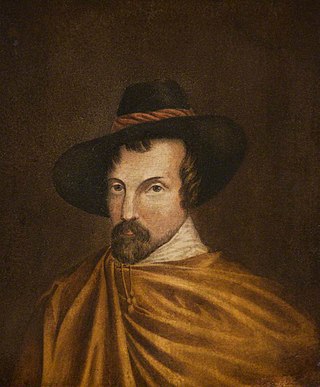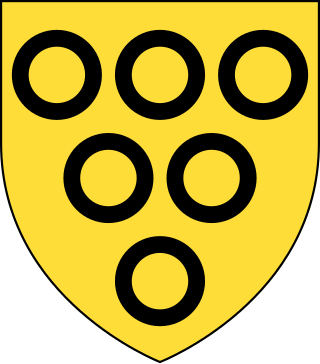Related Research Articles

Whitehaven is a town and port on the English north west coast and near to the Lake District National Park in Cumberland, Cumbria, England. It lies by road 38 miles (61 km) south-west of Carlisle and 45 miles (72 km) to the north of Barrow-in-Furness. It was the administrative seat of the former Borough of Copeland, and has a town council for the parish of Whitehaven. The population of the town was 23,986 at the 2011 census.

Earl of Lonsdale is a title that has been created twice in British history, firstly in the Peerage of Great Britain in 1784, and then in the Peerage of the United Kingdom in 1807, both times for members of the Lowther family.

Sir William Brereton, 1st Baronet, was an English religious Independent, author, and landowner from Cheshire. He was Member of Parliament for Cheshire at various times between 1628 and 1653, and during the First English Civil War, commander of Parliamentarian forces in the North Midlands.

John Tufton, 2nd Earl of Thanet was an English nobleman and supporter of Charles I of England. He was the eldest son of Nicholas Tufton, 1st Earl of Thanet, and Lady Frances Cecil, granddaughter of William Cecil, 1st Baron Burghley.
John Lowther may refer to:
Sir John Lowther, 1st Baronet was an English lawyer, landowner, and politician who sat in the House of Commons for Westmorland in 1628 and in 1660. He took no great part in the English Civil Wars.
Sir James Lowther, 4th Baronet, FRS was an English landowner, industrialist and Whig politician who sat in the House of Commons for 54 years between 1694 and 1755. His ownership and development of coal mines around Whitehaven in Cumberland gave him substantial revenues, and he was reputed the richest commoner in England.

Sir John Lowther, 2nd Baronet FRS was an English politician and landowner. Lowther was born at Whitehaven, in the parish of St Bees, Cumberland, the son of Sir Christopher Lowther, 1st Baronet, and his wife, Frances Lancaster, daughter of Christopher Lancaster of Stockbridge, Westmoreland. He was educated at Ilkley, Yorkshire and Balliol College, Oxford. He served as Member of Parliament for Cumberland from 1665 to 1701, and as a Lord Commissioner of the Admiralty from 1689 to 1696.

Sir John Borlase, 1st Baronet of Bockmer, Medmenham, Buckinghamshire was an English politician who sat in the House of Commons between 1640 and 1644. He supported the Royalist cause in the English Civil War.
George FitzGerald, 16th Earl of Kildare was known as the "Fairy Earl", apparently for no other reason than that his portrait, which is extant, was painted on a small scale."
Henry Parker (1604–1652) was an English barrister and political writer in the Parliamentarian cause.
Sir Richard Bolton was an English lawyer and judge, who was an important figure in Irish political life in the 1630s and 1640s.

The Tempest family was an English recusant family that originated in western Yorkshire in the 12th century.
Sir Hugh Owen, 1st Baronet was a Welsh politician who sat in the House of Commons variously between 1626 and 1660. He sided originally with the Parliamentarian side in the English Civil War, but the strength of his allegiance was in doubt.
Sir Gerard Lowther (1589–1660), sometimes referred to as Gerald Lowther, was a member of the well-known Lowther family of Westmoreland. He had a distinguished judicial career in Ireland, becoming Chief Justice of the Irish Common Pleas, although his enemies claimed his success was due to a complete lack of moral principles.
Sir Richard Lowther of Lowther Hall, Westmorland was an English soldier and official. He was twice High Sheriff of Cumberland and Lord Warden of the West March in 1592.eddotim
Sir Charles Vavasour, 1st Baronet, of Killingthorpe was an English soldier who fought the insurgents in the Irish Rebellion of 1641 where he excelled at the Battle of Liscarroll in 1642 but was defeated in the Battle of Cloughleagh of the ensuing Irish Confederate Wars. After the cease-fire of September 1643 he was sent to England to fight the Parliamentarians in the First English Civil War, but his regiment mutinied and he resigned his commission, dying soon after in Oxford.

The Lowther baronetcy, of Whitehaven in the County of Cumberland, was created in the Baronetage of England on 11 June 1642 for Christopher Lowther; he was the younger brother of Sir John Lowther, 1st Baronet, of Lowther.

The Lowther baronetcy, of Marske in the County of York, was created in the Baronetage of England on 15 June 1697 for the 21-year-old William Lowther, subsequently Member of Parliament for Lancaster. His father was Anthony Lowther. He was the grandson of the London merchant Robert Lowther, brother of Sir John Lowther of Lowther Hall, the father of Sir John Lowther, 1st Baronet, of Lowther.

The Lowther baronetcy, of Swillington in the County of York, was created in the Baronetage of Great Britain on 6 January 1715 for William Lowther II, Member of Parliament for Pontefract; His father William Lowther I had also been Member of Parliament for Pontefract. His grandfather was Sir William Lowther, brother of Sir John Lowther, 1st Baronet, of Lowther and Sir Christopher Lowther, 1st Baronet of Whitehaven, and the uncle of Sir William Lowther, 1st Baronet, of Little Preston.
References
- Hainsworth, D. R (2004). "Lowther, Sir Christopher, first baronet (1611–1644)". Oxford Dictionary of National Biography. Oxford University Press. Retrieved 19 May 2007.